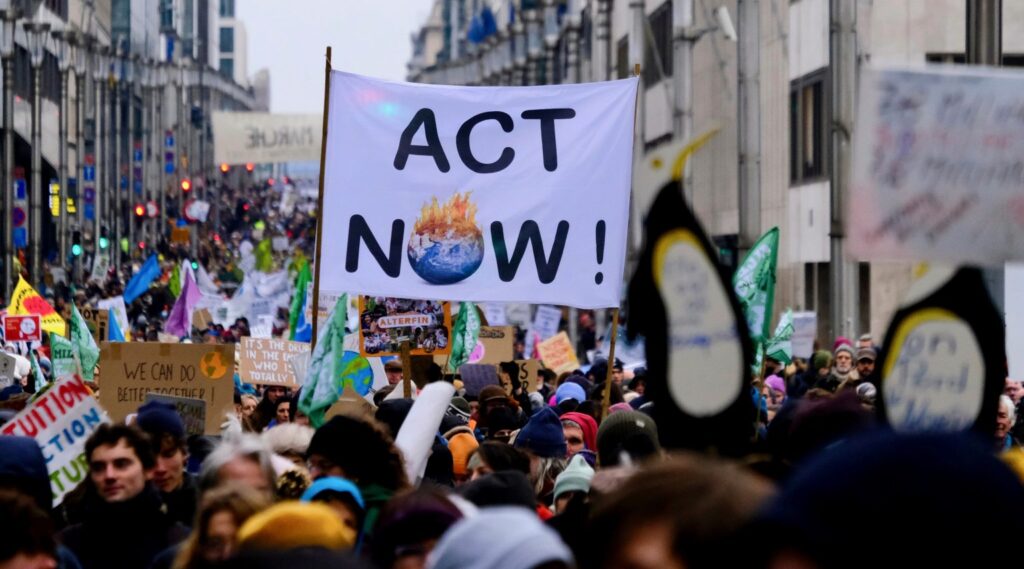Opinion: Feeling Helpless? This Is What You Can Do for the Climate

Climate protest in Brussels urging action at COP28. Photo: Alexandros Michailidis, via Shutterstock
Local and Green
This column also appeared in the Amherst Bulletin.

A lot of us are feeling like our beloved democracy is slipping away from us on a national, state and local level. Turning climate action around is especially necessary if we are to avoid catastrophic climate disruption. How can we keep up the drumbeat of resistance on climate action – until things turn around? Here are a few things you can do on a regular basis.
On the Federal Level
On a federal level, you can continue to call your legislators, even though we assume they are already resisting. We need to thank them for what they have done, and urge them to do more and to be creative. It is hard to imagine what pressure they are working under.
Five Calls provides an array of scripts to use when calling them. It takes about 5 minutes to make the calls.
Current climate or related actions provided by that website include demands to: Fund US Weather Prediction & Climate Science; Fight the DOGE-Directed Dismantling of the Federal Government; Protect Federal Forests: Oppose the Fix Our Forests Act; Protect Our National Forests from Unregulated Logging; and Protect FEMA from Elimination.
Also, make sure you demand action to maintain the EPA finding it published 16 years ago that six greenhouse gases are a threat to public health and must be regulated under the Clean Air Act. That finding provides the legal underpinning of a host of climate regulations under the Clean Air Act for motor vehicles, power plants and other pollution sources that are heating the planet.
Another action you could take is to show solidarity by attending National Indivisible/50501 standouts. The next one is Rage Against the Regime on August 2. Another activity I highly recommend is to attend Overpasses for Democracy on the fourth Fridays of the month. Overpass standouts have very high visibility to mixed audiences of passing cars.
On the State Level
On the state level, the most impactful work in my opinion is supporting two bills: the Make Polluters Pay bill and the Climate Bank Bill. They are the most impactful because they provide funding for action and that is the crux of what is needed.
The Climate Superfund (AKA, the Make Polluters Pay) Bill, H.1014 / S.588, is endorsed by many organizations. The bill aims to fund climate change adaptation and resilience projects by requiring major fossil fuel companies to pay for the damages their emissions have caused. A Superfund Bill was also enacted in both New York and Vermont.
The Climate Bank Bill, H. 3937, expands on the Governor’s Community Climate Bank, launched by Governor Healey in 2023 and expanded in 2024. It is the nation’s first “green bank” focused specifically on decarbonizing affordable housing. It began with $50M in seed money from the state’s Department of Environmental Protection, and aims to blend state, federal, and private capital. The model is to act as a revolving fund to support ongoing investment.
By contrast, Bill H.3937 has a broader scope. The proposed Climate Bank is envisioned as a standalone or independent public authority, not located in MassHousing, with a broader focus beyond just affordable housing. It would target financing innovation for climate and clean energy solutions across the public, private, and nonprofit sectors. The bank would be governed by an independent board and would be empowered to provide loans, loan guarantees, credit enhancements, and a variety of financial tools for a wide range of projects supporting greenhouse gas emissions limits, technical standards, climate job creation, and economic transition in both disadvantaged and rural/coastal communities.
In addition to these two important funding bills, the Massachusetts Chapter of the Sierra Club has a comprehensive list of 2025-2026 state legislative climate action priorities for which you can advocate..
On a local level, you can do a number of things.
You can speak up to urge action to implement your municipal climate plan. You can find out what your climate plan is, its goals and timeline, and who is in charge of implementing it. Some local climate action plans include Northampton’s, Amherst’s and Greenfield’s. You can push the town to act in moving off fossil fuel infrastructure in buildings, fleets, and electricity, to encourage a local circular economy and protection of farms and forests.
You can find local climate organizations to join forces with like Greening Greenfield, Franklin County Continuing the Political Revolution, Northampton Climate Emergency Coalition, Climate Action Now, Mothers Out Front (Amherst or Northampton), Sunrise Amherst and Sunrise UMass, and Local Energy Advocates.
You can take individual action to reduce greenhouse gas emissions by consuming less, wasting less, conserving energy and water, eating a plant-based diet, and moving off fossil fuels in your homes and vehicles.
You can display signs or other creations expressing your resistance.
Needless to say, we have to persist in this effort. Eventual success depends on our continued resistance, whether steady or passionate, to tyranny.
Darcy DuMont is a former town councilor and sponsor of the legislation creating the Amherst Energy and Climate Action Committee. She is a founding member of Zero Waste Amherst, Local Energy Advocates of Western MA, and a non-voting member of Valley Green Energy Working Group. She can be contacted at dumint140@gmail.com.
